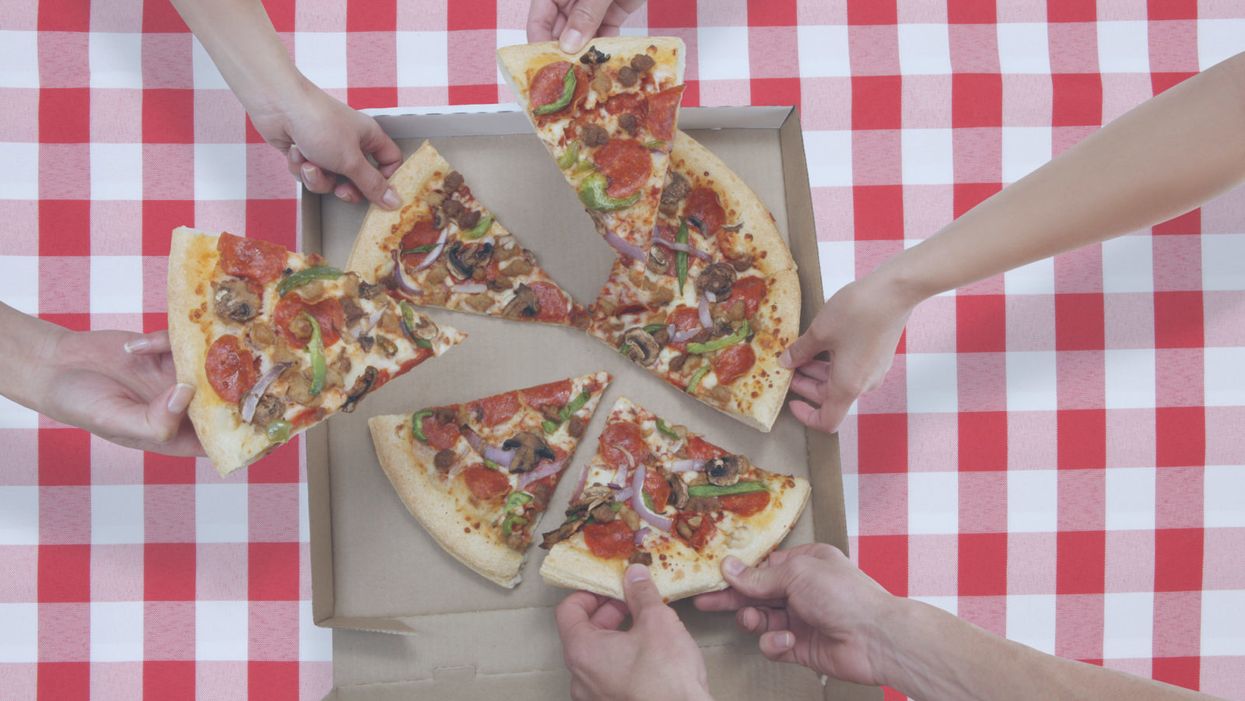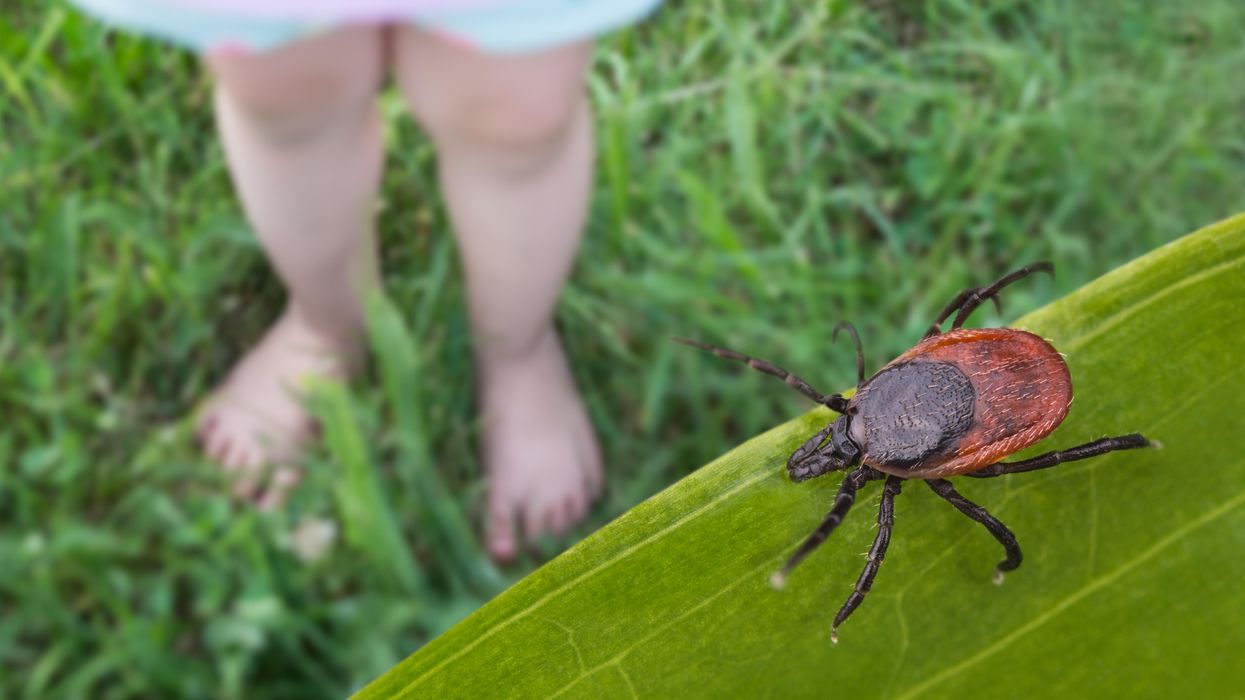Why You Can’t Blame Your Behavior On Your Gut Microbiome

People eating pizza; are they being influenced by their gut microbiome?
See a hot pizza sitting on a table. Count the missing pieces: three. They tasted delicious and yes, you've eaten enough—but you're still eyeing a fourth piece. Do you reach out and take it, or not?
"The difficulty comes in translating the animal data into the human situation."
Your behavior in that next moment is anything but simple: as far as scientists can tell, it comes down to a complex confluence of circumstances, genes, and personality characteristics. And the latest proposed addition to this list is the gut microbiome—the community of microorganisms, including bacteria, archaea, fungi, and viruses—that are full-time residents of your digestive tract.
It is entirely plausible that your gut microbiome might influence your behavior, scientists say: a well-known communication channel, called the gut-brain axis, runs both ways between your brain and your digestive tract. Gut bugs, which are close to the action, could amplify or dampen the messages, thereby shaping how you act. Messages about food-related behaviors could be particularly susceptible to interception by these microorganisms.
Perhaps it's convenient to imagine your resident microbes sitting greedily in your gut, crying for more pizza and tricking your brain into getting them what they want. The problem is, there's a distinct lack of scientific support for this actually happening in humans.
John Bienenstock, professor of pathology and molecular medicine at McMaster University (Canada), has worked on the gut microbiome-behavior connection for several decades. "There's a lot of evidence now in animals—particularly in mice," he says.
Indeed, his group and others have shown that, by eliminating or altering gut bugs, they can make mice exhibit different social behaviors or respond more coolly to stress; they can even make a shy mouse turn brave. But Bienenstock cautions: "The difficulty comes in translating the animal data into the human situation."
Animal behaviors are worlds apart from what we do on a daily basis—from brushing our teeth to navigating complex social situations.
Not that it's an easy task to figure out which aspects of animal research are relevant to people in everyday life. Animal behaviors are worlds apart from what we do on a daily basis—from brushing our teeth to navigating complex social situations.
Elaine Hsiao, assistant professor of integrative biology and physiology at UCLA, has also looked closely at the microbiome-gut-brain axis in mice and pondered how to translate the results into humans. She says, "Both the microbiome and behavior vary substantially [from person to person] and can be strongly influenced by environmental factors—which makes it difficult to run a well-controlled study on effects of the microbiome on human behavior."
She adds, "Human behaviors are very complex and the metrics used to quantify behavior are often not precise enough to derive clear interpretations." So the challenge is not only to figure out what people actually do, but also to give those actions numerical codes that allow them to be compared against other actions.
Hsiao and colleagues are nevertheless attempting to make connections: building on some animal research, their recent study found a three-way association in humans between molecules produced by their gut bacteria (that is, indole metabolites), the connectedness of different brain regions as measured through functional magnetic resonance imaging, and measures of behavior: questionnaires assessing food addiction and anxiety.
Meanwhile, other studies have found it may be possible to change a person's behavior through either probiotics or gut-localized antibiotics. Several probiotics even show promise for altering behavior in clinical conditions like depression. Yet how these phenomena occur is still unknown and, overall, scientists lack solid evidence on how bugs control behavior.
Bienenstock, however, is one of many continuing to investigate. He says, "Some of these observations are very striking. They're so striking that clearly something's up."
He says that after identifying a behavior-changing bug, or set of bugs, in mice: "The obvious next thing is: How [is it] occurring? Why is it occurring? What are the molecules involved?" Bienenstock favors the approach of nailing down a mechanism in animal models before starting to investigate its relevance to humans.
He explains, "[This preclinical work] should allow us to identify either target molecules or target pathways, which then can be translated."
Bienenstock also acknowledges the 'hype' that appears to surround this particular field of study. Despite the decidedly slow emergence of data linking the microbiome to human behavior, scientific reviews have appeared in brain-related scientific journals—for instance, Trends in Cognitive Sciences; CNS Drugs—with remarkable frequency. Not only this, but popular books and media articles have given the idea wings.
It might be compelling to blame our microbiomes for behaviors we don't prefer or can't explain—like reaching for another slice of pizza. But until the scientific observations yield stronger results, we still lack proof that we're doing what we do—or eating what we eat—exclusively at the behest of our resident microorganisms.
Podcast: The Science of Recharging Your Energy with Sara Mednick
For today's podcast episode, Leaps.org talks with Sara Mednick, author of The Power of the Downstate, a book about the science of relaxation - why it's so important, the best ways to get more of it, and the time of day when our bodies are biologically suited to enjoy it the most.
If you’re like me, you may have a case of email apnea, where you stop taking restful breaths when you open a work email. Or maybe you’re in the habit of shining blue light into your eyes long after sunset through your phone. Many of us are doing all kinds of things throughout the day that put us in a constant state of fight or flight arousal, with long-term impacts on health, productivity and happiness.
My guest for today’s episode is Sara Mednick, author of The Power of the Downstate, a book about the science of relaxation – why it’s so important, the best ways to go about getting more of it, and the time of day when our bodies are biologically suited to enjoy it the most. As a cognitive neuroscientist at the University of California, Irvine, Mednick has a great scientific background on this topic. After getting her PhD at Harvard, she filled her sleep lab with 7 bedrooms, and this is where she is federally funded to study people sleeping around the clock, with her research published in top journals such as Nature Neuroscience. She received the Office Naval Research Young Investigator Award in 2015, and her previous book, Take a Nap! Change Your Life was based on her groundbreaking research on the benefits of napping.
In our conversation, we talk about how work and society make it tough to get stimulation like food and exercise in ways that support our circadian rhythms, and there just as many obstacles to getting sleep and restoration like our ancestors enjoyed for 99 percent of human history. Sara shares some fascinating ways to get around these challenges, as well as her insights about the importance of exposure to daylight and nature vs nurture when it comes to whether you’re a night owl or an early bird. And we talk about how things could change with work and lifestyles to make it easier to live in accordance with our biological rhythms.
Show notes
3:10 – The definition of “upstates” and “downstates”
5:50 – The power of 6 slow, deep breaths per minute to balance the nervous system
9:05 – Watching out for mouth breathing and email apnea
13:30 – Different ways of breathing for different goals
16:35 – Body rhythms – what is heart rate variability and why is it so important?
21:05 – Are you naturally a morning or night person? Nature vs nurture
27:10 – The perfect storm that gets in the way of following our circadian rhythms
29:15 – The evolution of our pre-bedtime downstates – why it's important to check in with your cave mates
30:10 – The culture shift needed for more people to follow their circadian rhythms and improve their health
35:10 – Employers and communities can build downstates into daily work and life
38:15 – Choosing how we react to the world
41:00 – Being smarter about peak performance
45:09 – The science of pacing yourself for long-term productivity
49:42 – The science of light exposure for circadian rhythms
52:20 – Where to learn more about Sara Mednick’s research and writing
Links:
Sara Mednick’s website https://www.saramednick.com/ and her Twitter
Mednick’s recent book - The Power of the Downstate
Mednick’s book on the benefits of napping - Take a Nap! Change Your Life
The blue light blocking glasses recommended in Mednick’s book https://www.amazon.com/dp/B019C3O2UE?psc=1&ref=ppx_yo2ov_dt_b_product_details
An app for measuring heart rate variability - Elite HRV app https://elitehrv.com/
Thorne take-home Melatonin test
Podcast: The Friday Five weekly roundup in health research
Researchers are making progress on a vaccine for Lyme disease, sex differences in cancer, new research on reducing your risk of dementia with leisure activities, and more in this week's Friday Five
The Friday Five covers five stories in health research that you may have missed this week. There are plenty of controversies and troubling ethical issues in science – and we get into many of them in our online magazine – but this news roundup focuses on scientific creativity and progress to give you a therapeutic dose of inspiration headed into the weekend.
Covered in this week's Friday Five:
- Sex differences in cancer
- Promising research on a vaccine for Lyme disease
- Using a super material for brain-like devices
- Measuring your immunity to Covid
- Reducing dementia risk with leisure activities


